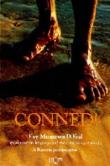AustLit
Latest Issues
AbstractHistoryArchive Description
'Language is power. It is used to describe and direct events fictional and true. This book describes how historians have manufactured a flattering Australian race relations history. Even today shameful colonial attitudes prevail - a new colonialism has emerged through our language.
'Conned! challenges established perceptions of indigenous Australians or Koories, as the author prefers to name Aborigines. Dr Fesl, a recognised linguist and Koorie culture specialist, brings unique insight to the suppressive role and divisive politics of language - a dilemma that affects all Australians, black and white. She makes clear the invisible text which creates a false and oppressive image of Koories as being inferior and in need of paternalistic aid.' (Publisher's blurb)
Publication Details of Only Known VersionEarliest 2 Known Versions of
Works about this Work
-
Book Reviews
1995
single work
review
— Appears in: The Aboriginal Child at School , August/September vol. 23 no. 3 1995; (p. 56-58)
— Review of Conned! 1993 single work prose -
Coming to Terms
1995
single work
review
— Appears in: Australian Women's Book Review , November vol. 7 no. 3-4 1995; (p. 23-24)
— Review of Conned! 1993 single work prose -
[Review Essay] Conned!
1994
single work
essay
— Appears in: Australian Aboriginal Studies , no. 1 1994; (p. 60-61)'For those of us involved in Australian language issues, this book should have been a landmark publication. Its author, Eve Mumewa Fesl, has solid academic credentials: she holds a doctorate in linguistics, has occupied several academic posts, and has a long record as an outspoken language-policy activist. So we come to this book, a product of her doctoral research, with strong expectations. Here, we might think, we will find something exciting and interesting—if not some original research, at least some unique synthesis of already available material, an authentic Koori voice speaking to us through the medium of Western scholarship. Unfortunately, this is not the case; in virtually all respects, this is a disappointing work. There is little here that is new in itself; there is nothing that has been put together in an interesting way. The book is poorly written and only loosely, ramblingly organised. And the standard of scholarship gives no indication of its origins in a doctoral program; in respect of its depth and breadth of research, it operates more at the level of popular journalism.' (Introduction)
-
Language is Power Says Koori Author
1993
single work
column
— Appears in: Koori Mail , 8 September no. 59 1993; (p. 18)
-
Coming to Terms
1995
single work
review
— Appears in: Australian Women's Book Review , November vol. 7 no. 3-4 1995; (p. 23-24)
— Review of Conned! 1993 single work prose -
Book Reviews
1995
single work
review
— Appears in: The Aboriginal Child at School , August/September vol. 23 no. 3 1995; (p. 56-58)
— Review of Conned! 1993 single work prose -
Language is Power Says Koori Author
1993
single work
column
— Appears in: Koori Mail , 8 September no. 59 1993; (p. 18) -
[Review Essay] Conned!
1994
single work
essay
— Appears in: Australian Aboriginal Studies , no. 1 1994; (p. 60-61)'For those of us involved in Australian language issues, this book should have been a landmark publication. Its author, Eve Mumewa Fesl, has solid academic credentials: she holds a doctorate in linguistics, has occupied several academic posts, and has a long record as an outspoken language-policy activist. So we come to this book, a product of her doctoral research, with strong expectations. Here, we might think, we will find something exciting and interesting—if not some original research, at least some unique synthesis of already available material, an authentic Koori voice speaking to us through the medium of Western scholarship. Unfortunately, this is not the case; in virtually all respects, this is a disappointing work. There is little here that is new in itself; there is nothing that has been put together in an interesting way. The book is poorly written and only loosely, ramblingly organised. And the standard of scholarship gives no indication of its origins in a doctoral program; in respect of its depth and breadth of research, it operates more at the level of popular journalism.' (Introduction)




